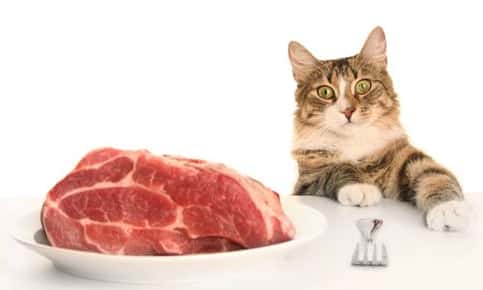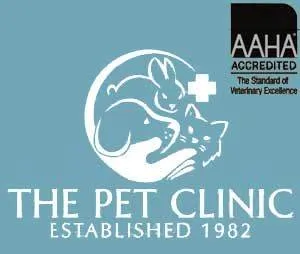
Raw diets offer an alternative to commercially prepared pet food and can be a good choice for some pets. Serving raw foods offer a variety of benefits, although the diet isn't appropriate for every cat or dog.
Why Offer Raw Food?
Commercially available pet food often contains preservatives or chemicals that prevent the food from spoiling and enhance taste. Many cat and dog foods also can contain large amounts of fillers, such as corn syrup, soybean hulls, wheat mill run, animal byproducts and citrus hulls. Some fillers are used to ensure that the food is nutritionally balanced, but others are high in fat and are the equivalent of junk food for your pet.
Feeding your pet a raw food diet can also prevent illness caused by the contamination of food with non-food substances. In 2007, thousands of pets died when melamine, a plastic-based material, was added to pet food ingredients produced in China.
When you choose a raw food diet, you know that every bite your pet eats is completely natural. Several companies sell frozen raw foods for pets, or you can create your own raw food menus using a pet food cookbook.
Advantages of a Raw Diet
When you feed your cat or dog a raw food diet, you may notice a difference in:
- Stools. When pets are fed a raw diet, stools are smaller, drier and less smelly.
- Allergies. Allergy symptoms disappear when your pet no longer ingests allergens found in pet food.
- Coat. After eating raw foods exclusively for a few months, you may notice that your pet has a shinier coat and healthier skin.
- Energy. Some fillers can make your pet feel lethargic. Energy levels tend to rise when dogs and cats are fed raw food diets.
- Teeth. Bone-in meats help pets keep their teeth clean
What Foods Are Included in Raw Diets?
Raw food diets may include the following ingredients:
- Muscle meat, such as beef, pork, chicken, venison, and turkey
- Whole or ground bones
- Kidneys, livers, and other organ meats
- Spinach, broccoli, and other vegetables
- Eggs
- Dairy products
- Fruit, such as bananas, apples, and papaya
- Oatmeal, brown rice, quinoa, and other grains and starchy vegetables
- Supplements to ensure that your pet receives any necessary nutrients not provided in the raw food diet
Dos and Don'ts of Feeding a Raw Food Diet
Keep these tips in mind when you begin feeding your pet a raw food diet.
Start Slowly
If your pet is used to eating commercially prepared food, making a sudden switch to a raw food diet can cause diarrhea. Offer only small amounts of raw foods at first to allow your pet's digestive system adequate time to adjust to the change.
Talk to Your Veterinarian If Your Pet Has a Health Problem
Don't begin a raw food diet without speaking to your veterinarian first if your pet has diabetes, kidney failure, or another health problem. Although the diet is usually a good choice for healthy animals, it can cause problems for pets that suffer from chronic illnesses.
Avoid Road Kill
Road kill can quickly become rancid and may sicken your pet. Avoid feeding it to your pet, and don't feed any meat that looks or smells bad.
Make Cleanliness a Priority
Wash your hands with soap and water after handling raw foods and thoroughly disinfect knives, dishes and cutting boards with a solution of bleach and water. Failing to disinfect utensils and dishes used to prepare raw foods can put your family at risk of becoming ill if the meat contains bacteria or other food-borne pathogens.
Are Raw Food Diets Appropriate for All Pets?
Although raw food diets can improve your pet's health, they may not be a good idea in some cases. Since these diets are very high in protein, they are not an appropriate choice if your pet has liver or kidney failure. Pets that have compromised immune systems or are undergoing chemotherapy also should not eat raw diets. If they happen to eat food that contains salmonella or the E. coli bacteria, it may be much harder for them to recover from an illness due to their weakened immune systems.
A raw food diet is not generally recommended for puppies and kittens, as it's more difficult to ensure that the diet contains enough calcium and another minerals and nutrients needed for normal growth and development.
Would you like to feed your pet a raw food diet but are not sure if it's the best choice? We will be glad to help you weigh the pros and cons. Call us to schedule a convenient appointment.
Sources:
WebMD: Raw Dog Food: Dietary Concerns, Benefits and Risks
http://pets.webmd.com/dogs/guide/raw-dog-food-dietary-concerns-benefits-and-risks
U.S. Food and Drug Administration: Get the Facts! Raw Pet Food Diets Can Be Dangerous to You and Your Pet, 07/13/16
http://www.fda.gov/AnimalVeterinary/ResourcesforYou/AnimalHealthLiteracy/ucm373757.htm
Healthy Pets: Common Feeding Mistakes That Can Harm Your Pet, 04/15/13
http://healthypets.mercola.com/sites/healthypets/archive/2013/04/15/raw-food-diet-part-3.aspx
Modern Dog: The Raw Debate
